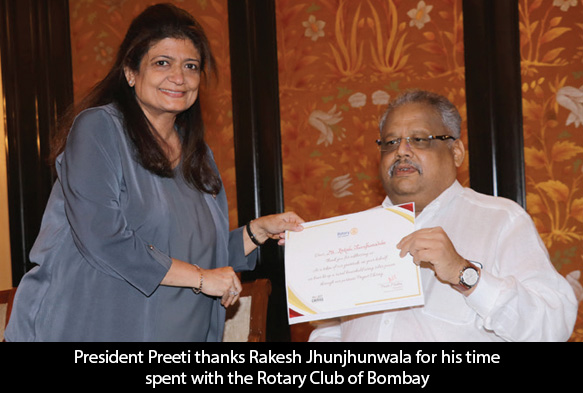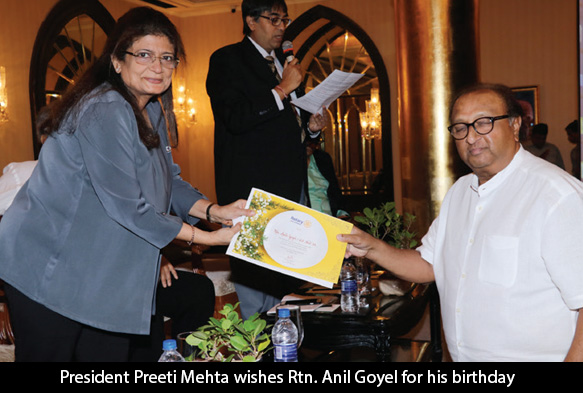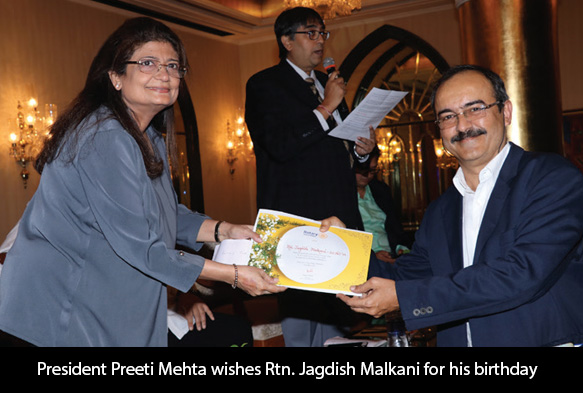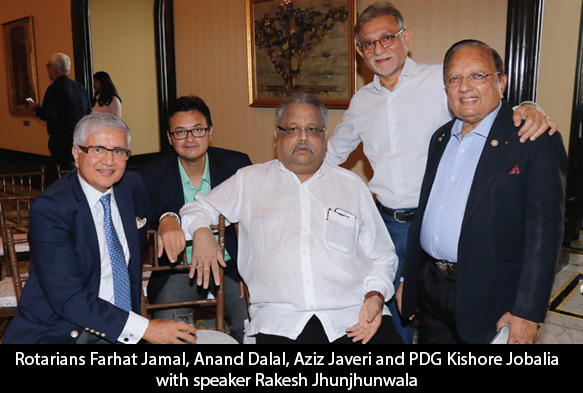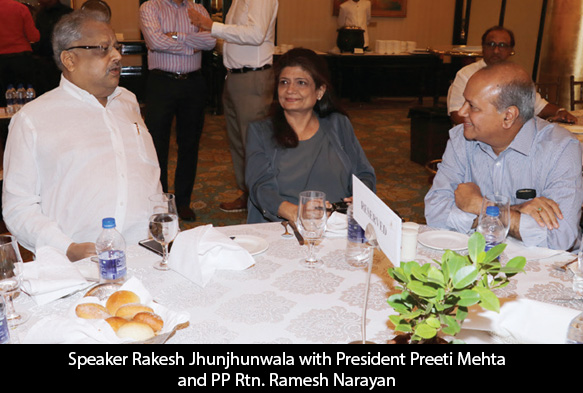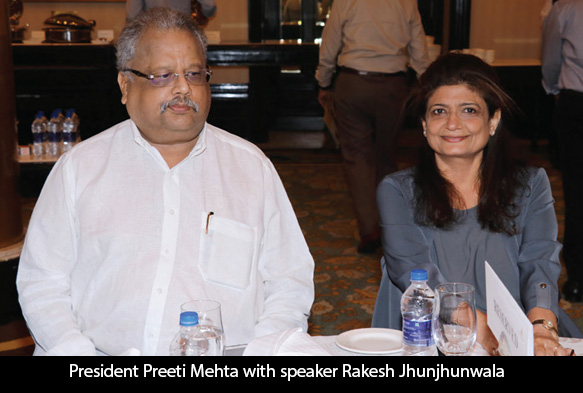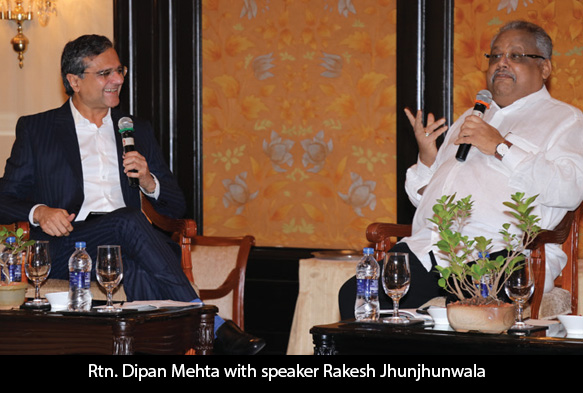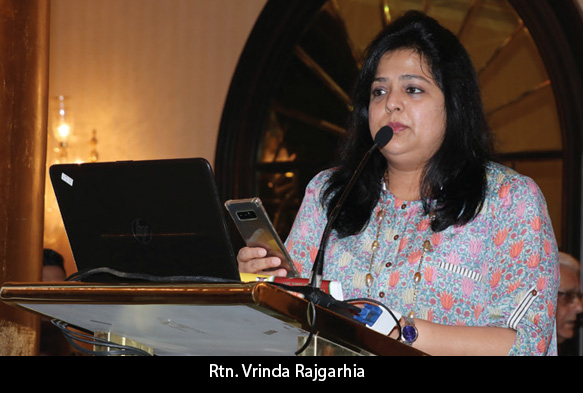
A Dalal Street Named Desire
Investment guru Rakesh Jhunjhunwala answers all queries about success in the stock market
WE got Independence in 1947 but our animal spirits were unleashed in 1991 when liberalisation started. We are all actually products of that era. Since then, we have been aspiring a double-digit growth rate but that seems to be quite elusive at this time. In fact, estimates show that we might grow at half of the aspired growth rate. So, do you think this 10 per cent growth rate is just a pipe dream? Do you think we have the capacity to grow at that level?
Surely we have the capacity to grow at 10 or more for at least two or three decades. Having said that, the fact is that India has not realised its true potential; we cannot forget that India has raised its base level of growth in every decade. It is only in the last two to three years that the rates are low. And, don’t forget that when there is a democracy, there are various loopholes. It was the worst in 1991 which got us the best economic reform. The transformation since is very simple.
If you look at the rich people of ’91, they were old; if you look rich people today, 75 per cent are first generation. Every society has to evolve. I am no economist but I don’t mix economic realism and financial matters with patriotism. So, what I recognise is that India has all the ingredients to create a prosperous society. Every society has its fastest growth in the most favourable time of demography. India’s most favourable time is for the next 30 years.
You look at natural resources – God cannot be so unkind that he will give oil only in the deserts of Arabia and not in the deserts of Rajasthan; you only have to find it. Then, we are a democracy. I have seen no society which has achieved prosperity and has retained it without a democracy. We have put the cart before the horse. We are paying a price but whatever we are doing we know it is short, we know what is happening. In India, things cannot happen as they are in Russia or China. So India has all the potentiality to reach double digit growth.
Why don’t we reach there then? India is a democracy with various pulls and pressures. You are going through a process of change. Why is corporate India unhappy with the government? Pehle kuch bhi chalta thha, abb nahi chalta. So, you are going through the process from a cowboy society to a society with respect for the law. This is the process of change. I have full faith in the ability and skills of Indian. Every other day you read in papers that 20 Americans died in a fire – is that society is safe? And yet we feel it is safe to send our children there. But when there is lynching in India, India is unsafe. Look at the diversity in society – there is no other country which has 22 languages recognised in its Constitution.
As an Indian, I am not satisfied either but let’s not forget the realities, we have raised our capacities. America is confused, but progress does not come out of order, it comes out from chaos. We say corruption. What is our standard of corruption? I don’t pay income tax? I paid Rs 2 lakh to the ITO and call him corrupt. But this is collaborative corruption. Indians face extractive corruption, 500 rupaiye do nahi toh ration card nahi milega.
So, I remained the eternal India bull because I recognised that India is going to prosper. I have put all my money in equity – whatever I had from 1986 – I have one crore in funds in Provident Fund and 50,000 in Andhra Bank Fixed Deposit, to get a locker. I do not have one rupee beyond interest to anybody. I put in equity and see the results.
In every interview you are asked: mid cap or large cap and I know your answer to it is – I want to buy a small cap which will become a large cap, yet, consolidation is taking place in every industry. The big are becoming bigger and small companies are having a tough time. On the investment front, start-ups are getting funded by private equity and the cream is taken by private equity. In such a situation, do midcaps have a chance?
When you approach a girl, you do not think chhoti honi chahiye, lambi honi chahiye, gori honi chahiye, Hindu-Muslim. Let’s approach a company as a company here. Let’s examine the essential principle which remains the same. Markets, at time, made inherently unsustainable evaluation in midcaps from 2016-18. Now every action has a reaction. I don’t prejudice my mind that this is a small cap and large cap, but the best opportunities lie in neglected areas of the market.
Which do you think they are? I don’t know as of now but as a group small caps are not as much in favour as large caps.
What should be the expected returns in the stock market?
My personal expected return in my portfolio is 15 to 20 per cent. Otherwise, I would have been in debt. Those returns are impossible because this year India will see one of the lowest, nominal growths we have ever seen. The second part is that you get money in BSE today faster than you did when you sold your shares. We have the best regulations in the world.
You have created institutions which will tap the market money in the stock market, mutual funds and life insurances. You do not have pension fund money coming into this country. Whenever India is a 500 trillion dollars economy with 18 per cent family sector, household will be US$ 900 billion. In America, 31 per cent household wealth is equity; in India it is 3 per cent; 42.96 per cent is marginal rate of tax for income above Rs 5 crore over regular income and 11.96 per cent is rate of tax on long-term capital. Now, you understand, if I get 12 per cent in equity today, it still means 10 per cent and 8 per cent in debt means 5 per cent of equity. And If I get a return of 12 per cent my money doubles in six years and if I get 6 per cent my money double in 12 years.
You are bullish in real estate, abhi dalal ko bulao, ye building dekhi, title search karo. It’s on screen I pay, tomorrow the share price is 250, I don’t have to tell anybody, I sell the share, day after tomorrow money will be in my account. The ease at which I can trade, I can borrow money. So how can you ignore equity. Everything to me is attitude. You compare the risk and return possible to other alternatives forms of investment and how a difference of 6-8 per cent return what it means to you. So my common sense: the best form of saving is equity and not by getting excited.
With the way the market had moved, there have been huge price damages and accident.
The accident is because of your greed. Who told you to buy mid cap stocks 50 times early? It is very popular to do what is popular in the market but it is not profitable, my friend.
So let’s get on this valuation, what Warren Buffett says: the best returns are in the buying businesses at reasonable valuations. But it has not appeared so.
I have bought two companies, very good value. And see Warren Buffett can tell us adjectives but to apply to those adjectives to those situations is very difficult. Where are the situations? You can fall in love with a beautiful girl but where is the beautiful girl? Where do you find them? The two most difficult adjectives are value in a stock and beauty in a girl. Because, they mean different things to different people. It’s personal. You can always find good business and good valuation in all kinds of market. Don’t go for relative valuations.
So you are not concerned about valuations?
Mere maa baap ka kya jata hai? I am not buying them, I am not selling them. You got to do the homework and have an attitude. Markets are not like someone gives you a tip. It’s not a lottery.
It is the spending habits of millennials. I have a son and I wanted to buy him a car. He said no, put the money in the stock market. This generation is avoiding capital assets: no flats, no cars, no expensive jewelry. They want to focus on experiences.
But then, at the moment, it is applicable to 0.005 per cent of Indians. India lives in villages and they have their aspirations. Mereko itna dukh hota hai, mere kids maanne wale nahin hai, sola saal mein hum unko uss society mein bhej rahe hain. I have no choice. What are we doing? I don’t think what you presenting represents India. There are two lakh Indian students in America; it was the headlines of The Times of India today, this is the habit of those two lakh.
But this is the reason why they say auto sales are low.
All crap! You want to take your girlfriend in a car or in an Uber? See, change is overestimated and over-valued.
You invest a lot with intuition but do you follow a criteria or a checklist?
We invest out of informed ignorance where we learn to make 2+2 is 22, not 2+2 is 4. We invest in the future, it is always uncertain and you can’t predict it. What you can predict is direction and what you know is present valuation. So look at the big picture. I invest in everything, can I know everything? So, therefore, we have to invest in an uncertain future. There is a company risk. I have thought, the process of learning is a journey, not a destination. There is no definitive style but I am a fast learner and I am not afraid to make mistakes. I make affordable mistakes so I can lift it. People think I am smart but I know what dumb mistakes I have made. But, accept it, forget it.
Some lessons?
I make mistakes in judging people’s character. I have identified great opportunities, great recognition, a very good start but then did not succeed mainly because of people’s character. It was not the money loss that hurt but that I judged the character of the person wrongly. All governance comes by attitude. It is important that you buy, not what you buy.
What are the red flags that you see in a particular stock?
The best selling I have done is in PSU: a lot of public sector stocks because at a certain level it needs leadership. The wisest is I didn’t buy in SBI.
Why don’t you invest in unlisted companies?
Who said? My unlisted portfolio is at least 30 per cent of my listed portfolio and some are very well-doing investments. All those companies are good. When I invested in Metro the turnover was 80 crore. This year I think it will 1400 crore. There is a lot to learn from investment in unlisted companies. You know what is required to grow the business, the mistakes. I enjoy them.
If you were reborn, would you like to be an actor, business man or a politician?
I would like to be born as Rakesh Jhunjhunwala with Rekha Jhunjhunwala as his wife and with same parents. The pleasure is unbelievable.
If you had a 25-hour day, what would you spend that extra hour on?
Exercise.
Which one sector is most likely to give superior return: banking, pharma or consumption?
First pharma, then banking. Dawaai toh khani padegi. 45 per cent of all medicine eaten in America is made in India; people are underestimating the pharma industry.
When picking a stock, you are least likely to compromise on growth, valuation, corporate governance or management
competency?
Not on valuation. Most Important is what I buy.
What do you think of the cosmetic industry?
It is growing; men’s cosmetic industry is growing too. I have some investments in the cosmetic industry too.

